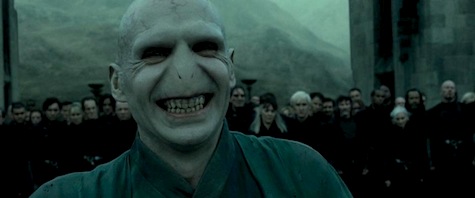In my new thriller, The Cure, the science of psychopathy takes center stage. And since I’ve been a science fiction geek all of my life, this beloved genre also plays a major role in the novel.
So to celebrate the book’s release, I wrote The Sci-fi Psychopath Quiz. Part I of the quiz appeared here earlier. But fear not. If you wish to proceed without reading Part I, here is all you need to know before you begin:
- Scientists are uncovering differences between the brains of psychopaths and normals, which could well contribute to some of the behaviors associated with this condition.
- Psychopaths are characterized by fearlessness, lack of conscience, selfishness, and an unequaled ability to lie and manipulate.
- Psychopathy and sociopathy are nearly identical conditions. Leading experts classify the condition as psychopathy when it is more on the innate side, and sociopathy when it is more due to environmental influences (i.e. psychopaths are born, sociopaths are made). Sociopaths can be brutal killers but have the capacity to care about others. Psychopaths have zero loyalty to anyone but themselves.
So with this as background, let’s get to our first science fiction super-villain:
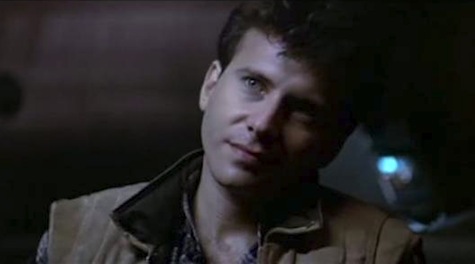
CARTER BURKE (Aliens)
“I’m Burke. Carter Burke. I work for the company. But don’t let that fool you. I’m really an okay guy.”
The real monster in James Cameron’s monster movie, Carter Burke fits the profile of a psychopath like a glove. He’s manipulative, self-serving, has no conscience, and has a heart blacker and colder than deep space itself. He sets two facehuggers free so they can impregnate Ripley and the little girl, Newt, and he turns off the monitors so no one can come to their rescue. His plan: kill the crew while they’re in deep sleep and smuggle the aliens inside Ripley and Newt—for financial gain. Later, when the aliens attack, he takes what he thinks is an escape route, and locks out everyone else.
The Alien Queen’s blood might be acid, but Burke’s blood is pure ice. Ripley says it best, “You know, Burke, I don’t know which species is worse. You don’t see them f-ing each other over for a goddamn percentage.”
Correct Answer: Psychopath
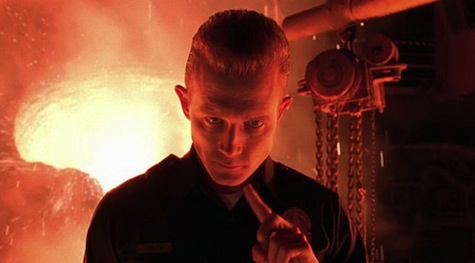
TERMINATOR T-1000 (Terminator II)
“He’s a good looking boy. Do you mind if I keep this picture?”
Okay, most of you will think this one is painfully obvious. And maybe it is. But on the other hand, maybe it isn’t. T-1000 certainly behaves like a psychopath. It doesn’t experience empathy or remorse. And you can’t argue it isn’t manipulative, an accomplished liar, and deceptive. I mean, come on, not even Hannibal Lecter could alter his appearance and voice to perform perfect impersonations, and even pretend to be a floor!
So why don’t you think the Terminator is a psychopath? Because it’s a machine, right? And this term doesn’t apply to a machine. But is this Terminator just a machine? Could T-1000 pass the Turing test?
Regardless, I think most of us would address the question of T-1000’s psychopathy in terms of free will. The Terminator’s actions are those of a psychopathic monster, but that’s only because of its programming. This total lack of free will changes how we characterize its behavior.
But what if we come to find that human psychopaths are more or less programmed by their genes and brain structure? What if they have less free will with respect to their behavior than previously thought? I won’t address this complex and fascinating philosophical question here, but the more I researched and pondered the psychopathic condition prior to writing The Cure, the less straightforward certain ethical issues became.
Correct Answer: Not a Psychopath
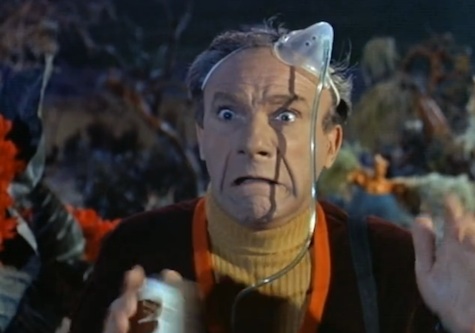
DR. ZACHARY SMITH (Lost in Space, TV series and Movie)
“There are monsters everywhere… I know. I am one.”
So what is different about the television and movie Smiths? One word: Fear. The movie Smith is a psychopathic monster and knows it. And seems to like this just fine, which is another characteristic of psychopaths. They feel great about themselves and even superior to the rest of us. They don’t think there is anything the least bit wrong with their behavior.
The TV version of Smith, on the other hand, may be a manipulative, self-serving, narcissistic, remorseless sociopath—but he is also a coward. Psychopaths are characterized by fearlessness, and even risk-seeking behavior. Studies have shown psychopaths have fewer connections between the ventromedial prefrontal cortex and the amygdala, which mediates fear and anxiety. A psychopath doesn’t experience fear the way a normal person does, as measured by physiologic indicators such as sweat levels and heart rate. That’s why you don’t see many scenes of Voldemort cringing in fear. The TV version of Smith, on the other hand, could have played the cowardly lion in the Wizard of Oz.
Trick Question: Both! (Movie Smith: psychopath, TV Smith: sociopath)
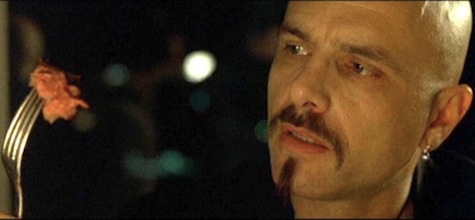
CYPHER (The Matrix)
“All I do is pull a plug here, but there… you have to watch Apoc die.”
It might be tempting to go with sociopath here. After all, Cypher’s nine years of being in the real world, after Morpheus had the audacity to extricate him from the matrix, were highly stressful. So one might argue that Cypher is simply a sociopath who has a beef with Morpheus. (Beef, get it? One reason Cypher wants to return to the matrix is his love of steak. I crack myself up).
But that doesn’t explain his total lack of loyalty. Cypher’s deal with Agent Smith was simply to deliver Morpheus. Killing everyone else in sight wasn’t part of it. So sociopathy doesn’t explain the joy Cypher seems to take at zapping Tank and Dozer, and rubbing it in as he unplugs the helpless Switch and Apoc. Cold, dude! Very, very cold. And by helping Smith achieve his Holy Grail—gaining the access codes to the Zion mainframe—Cypher isn’t just screwing over the crew who treated him like a brother, but the entire human race. Whoa.
But when I think about it further, do you know what really bakes my noodle? If Cypher hadn’t committed this atrocity, would Neo have ever discovered his, well… Neo-ness?
Things were clearly destined to happen the way they did, since the Oracle foretold that Neo would have to choose between himself and Morpheus. So if the Oracle knew what Cypher was up to and did nothing to stop him… is she the bigger psychopath? Or was she just allowing these good people to be sacrificed in service to the bigger picture? Was there really no other way to bring out the Neo in Mr. Anderson?
Okay, in the movie, the Oracle is clearly one of the good guys, but not because she comes across as a kindly grandmother who bakes delicious cookies. Psychopaths can be among the most charming, seemingly harmless people on the planet. So be careful. They can fool even researchers who have studied this condition for many years.
Correct Answer: Psychopath
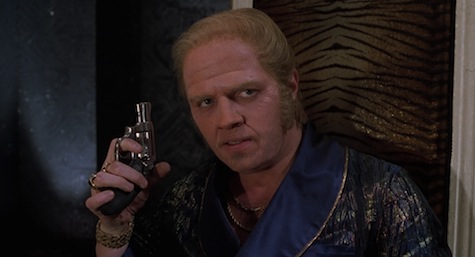
Biff Tannen (Back to The Future Trilogy)
“Kid, I own the police! Besides, they couldn’t match up the bullet that killed your old man.”
This movie performs an ideal controlled experiment. It keeps Biff’s genes exactly the same while varying his environmental circumstances. Since this only requires a simple comparison of two versions of the same person across parallel universes, it’s not clear to me why scientists have yet to try it.
In my view, this experiment shows that Biff is a sociopath. Why? Because his behavior is less innate, and more a product of circumstance. Seems all he needed was a good punch in the face from George McFly at the Enchantment Under the Sea dance to go on to become a docile and subservient auto detailer.
Correct Answer : Not a Psychopath
So that completes my quiz. But before I stop, I have two science fiction villains I feel compelled to bring up. While I won’t be analyzing them as part of this quiz, they are favorites of mine and deserve honorable mentions.
LOKI (Thor, The Avengers)

Psychopath? Or just daddy issues? How would any of us react to learning our father was actually a Frost Giant from Jotunheim? On the other hand, in the comics he earned the nicknames, God of Lies and Mischief, and God of Evil. Um… that can’t be good.
SYNDROME (The Incredibles)
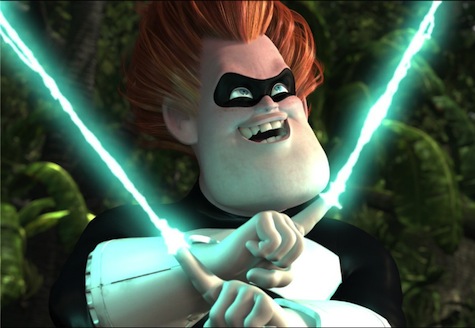
I absolutely love The Incredibles. And I have to admit, while Syndrome may be a seriel killer of supers and a kidnapper of totally helpless babies like Jack-Jack (okay, maybe not totally helpless), I can’t help but identify with him in some ways.
While he did show poor judgement by not consulting with Edna Mode about the wisdom of wearing a cape, who wouldn’t want to be smart enough to be able to turn themseles into a superhero?
And I couldn’t help but feel an affinity to this super-villian when he said to Mr. Incredible, “You know, I was right to idolize you. I always knew you were tough, but tricking the probe by hiding under the bones of another super? Oh, Man! I’m still geeking out about it!”
Syndrome may have pyshopathic tendencies, but it seems pretty clear to me that, at heart, he’s nothing but a fellow science fiction geek.
And if this is the case, just how bad could he really be?
Douglas E. Richards, who penned The Cure, is a New York Times bestselling author widely praised for his ability to weave action, suspense, and science into riveting novels that straddle the thriller and science fiction genres. A former biotech executive, Richards earned a master’s degree in molecular biology from the University of Wisconsin, where he genetically engineered mutant viruses that are now named after him.










